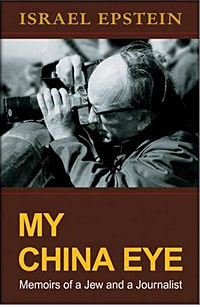|
On April 20, 2005, special celebration was held in Beijing to mark Israel Epstein's 90th birthday and the publication of his memoirs. Now he is gone. This unfortunate turn of events lends urgency to my review of his book -- now his swan song. I know Epstein well through 50 years' personal ties. He would not want us to weep for him, but rather to remember his warmth, his humanity and dedication to the cause of the common people, and especially his work to promote understanding among all peoples which he took as his lifelong task. My China Eye was Epstein's final effort to achieve this purpose.

Epstein's parents were Polish Jews and socialist revolutionaries, who were tossed by the currents of history following WW I -- war and revolution -- to semi-colonial China. Born in pre-WWI Poland, Epstein first lived with his parents in Japan, and then moved to Northeast China's Harbin and North China's Tianjin. He was educated in Tianjin's American School where the precocious child read avidly and immersed himself in Western culture, both classical and modern, while mastering precious language abilities -- speaking and writing in both English and Russian. Though still in his teens, he cherished deep sympathy for the common people, having been influenced by his parents' socialist thinking.
In the first three chapters, Epstein gave a first-hand account of life in semi-colonial China, especially his roots and upbringing -- the novels he read, the revolutionary songs his mother taught him, his interactions with his classmates, some of whom later matured to become famous writer, dancer or musician -- and vivid descriptions of life in foreign enclaves during the 20s and 30s of the 20th century. Then, in the chapter entitled "Early Start in Journalism", we read that Epstein began his reporting career unusually early. He was already working for an émigré Russian paper when he was 15, and at 16, he was on the staff of an English paper called Peking and Tientsin Times. This started Epstein's life-long career in the journalist field. While he moved from job to job, becoming more and more experienced and mature, the threat of Japanese imperialist war and domination also became increasingly serious. As Chinese resistance stiffened, Epstein came into contact with a growing number of Chinese patriots, many of whom were underground communists. This first-hand experience made Epstein, as with many other Western reporters, critical of the Japanese invaders and sympathetic towards the Chinese patriotic cause. The outbreak of large-scale Japanese invasion following the Lugouqiao (Marco Polo Bridge) Incident in July 1937 was the turning point. From then on, Epstein threw himself whole-heartedly into wartime reporting. From being sympathetic with the Chinese people and sharing their sufferings, he soon made their cause his own.
From 1937 to late 1938, Epstein was at the storm centers of the Japanese invasion, Nanjing, Wuhan and Guangzhou. Experiencing air raids hundreds of times, he saw the brutalities of the invaders and the heroism of the people under attack. He also witnessed the workings of the Kuomintang-Communist united front, and the international support rendered to the Chinese from all sides. Epstein covered the Tai'erzhuang campaign, one of the few battles the Kuomintang troops won against the Japanese. When Guangzhou fell into Japanese hands, Epstein moved to nearby Hong Kong, where he joined the staff of China Defense League which was under the auspices of Dr. Sun Yat-sen's widow, Madame Soong Ching-ling, and whose task was to mobilize international support for China's armed resistance. Thus began a close friendship which lasted several decades and led to the eventual authorization by Soong Ching Ling for Epstein to write her biography following her death. In their personal co-operation we sense the quintessence of internationalism for a common ideal and cause.
|
